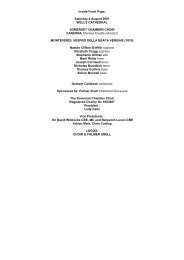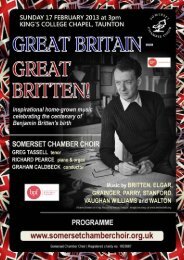Click here to view the concert programme - Somerset Chamber Choir
Click here to view the concert programme - Somerset Chamber Choir
Click here to view the concert programme - Somerset Chamber Choir
You also want an ePaper? Increase the reach of your titles
YUMPU automatically turns print PDFs into web optimized ePapers that Google loves.
Programme notes<br />
Johann Sebastian Bach (1685-1750)<br />
Cantata: Nun danket alle Gott BWV 192<br />
The circumstances for which Bach composed his festive cantata Nun danket alle Gott BWV<br />
192 (Now thank we all our God) around 1730 are unknown. Because of its central duet for<br />
soprano and bass, some scholars have speculated that it was written for a wedding.<br />
However, because of its three-verse text (written by Martin Rinckart in 1636), o<strong>the</strong>rs guess<br />
that it might have been intended for <strong>the</strong> Lu<strong>the</strong>ran Feast of <strong>the</strong> Reformation. Rinckart<br />
(1586-1649) was a German clergyman and hymnist, best known for this particular hymn<br />
text that was written against a backdrop of plague and all <strong>the</strong> horrors of <strong>the</strong> Thirty Years’<br />
War (1618-48). Rinckhart’s hymn was set <strong>to</strong> music by Johann Crüger in about 1647, and<br />
translated in<strong>to</strong> <strong>the</strong> familiar English version in <strong>the</strong> 19th century by Ca<strong>the</strong>rine Winkworth.<br />
Although <strong>the</strong> three-movement cantata is one of Bach's shortest, it is richly scored for soprano and bass soloists, chorus,<br />
pairs of transverse flute and oboes, strings, and basso continuo. The joyous and exuberant opening chorus is a large-scale<br />
chorale fantasia with <strong>the</strong> sopranos singing <strong>the</strong> first verse of Rinckart's hymn in slow notes above an imitative tapestry<br />
woven by <strong>the</strong> lower voices, while <strong>the</strong> full orchestra has its own independent music in <strong>the</strong> ri<strong>to</strong>rnelli. The second movement<br />
is a gracious and graceful dance-like duet aria for soprano and bass with obbliga<strong>to</strong> transverse flute and oboe, strings,<br />
and continuo, in which t<strong>here</strong> is much canonic writing between <strong>the</strong> soloists. The vigorous final movement is ano<strong>the</strong>r<br />
chorale fantasia in which <strong>the</strong> sopranos sing <strong>the</strong> third verse of Rinckart's hymn above <strong>the</strong> imitative entries of <strong>the</strong> lower<br />
voices, both musical strands woven <strong>to</strong>ge<strong>the</strong>r and combined with <strong>the</strong> gigue-like orchestral writing that is reminiscent of<br />
Bach’s 3rd Orchestral Suite, composed in Cö<strong>the</strong>n about a decade earlier, and regularly performed by Bach and his<br />
Collegium Musicum in Leipzig.<br />
1. Chorus<br />
Nun danket alle Gott<br />
Mit Herzen, Mund und Händen,<br />
Der große Dinge tut<br />
An uns und allen Enden,<br />
Der uns von Mutterleib<br />
Und Kindesbeinen an<br />
Unzählig viel zugut<br />
Und noch itzund getan.<br />
Now all thank God<br />
with heart, mouth and hands;<br />
He does great things<br />
for us and all our purposes;<br />
He for us from our mo<strong>the</strong>r's womb<br />
and childish steps<br />
countless great good<br />
has done and still continues <strong>to</strong> do.<br />
2. Aria (Duet<strong>to</strong>) [Soprano, Bass]<br />
Der ewig reiche Gott<br />
Woll uns bei unserm Leben<br />
Ein immer fröhlich Herz<br />
Und edlen Frieden geben<br />
Und uns in seiner Gnad<br />
Erhalten fort und fort<br />
Und uns aus aller Not<br />
Erlösen hier und dort.<br />
May God who is forever rich<br />
be willing <strong>to</strong> give us in our life<br />
a heart that is always joyful<br />
and noble peace<br />
and in his mercy<br />
maintain us for ever and ever<br />
and free us from all distress<br />
<strong>here</strong> and t<strong>here</strong> (both on earth and in heaven).<br />
3. Chorus<br />
Lob, Ehr und Preis sei Gott,<br />
Dem Vater und dem Sohne<br />
Und dem, der beiden gleich<br />
Im hohen Himmelsthrone,<br />
Dem dreieinigen Gott,<br />
Als der ursprünglich war<br />
Und ist und bleiben wird<br />
Jetzund und immerdar.<br />
Glory, honour and praise be <strong>to</strong> God,<br />
<strong>to</strong> <strong>the</strong> Fa<strong>the</strong>r and <strong>to</strong> <strong>the</strong> Son<br />
and <strong>to</strong> Him, who is equal <strong>to</strong> both<br />
on heaven's high throne,<br />
<strong>to</strong> <strong>the</strong> triune God,<br />
as he was from <strong>the</strong> beginning<br />
and is and will remain<br />
now and forever.<br />
English Translation by Francis Browne












